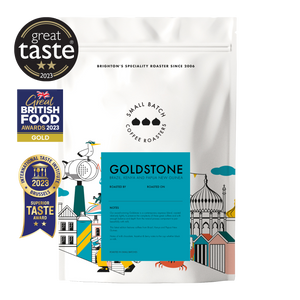Small Batch Coffee and Sustainability
Aug 26, 2024
Let's Talk Sustainability
Since 2023, we’ve been working to improve the sustainability practices throughout our supply chain, from suppliers and partners to packaging and processes. We’ve been making incremental but impactful changes that work towards carbon reduction and limiting environmental impact in our local community. But there is more to be done - we may be Small Batch but we think BIGGER - on a global scale in fact.
As a business that sources coffee from all corners of the planet, we’re very aware of the environmental impact that each order of Green coffee has and, as part of our sustainability and carbon reduction journey, we wanted to look at how we can effectively reduce our carbon footprint by 2030.
We all know that climate change is real and, more than ever, there is a huge global focus on it. Currently, the Earth is already about 1.1°C warmer than it was in the late 1800s, and if current trends are not reversed then temperatures could rise by +4 degrees this century, continuing to threaten both wildlife and human species [1]. The global goal is to limit this to 1.5 degrees above preindustrial temperatures and to do this emissions need to be reduced by 45% by 2030 [2]
With this in mind, we’ve partnered with Zerobees over the past few months to measure our carbon footprint and develop a clear plan to reduce our emissions. The journey has been enlightening and now we want to share the results with you.
You will notice that along our journey, we will often talk about Carbon Reduction rather than Carbon Neutral. But why?
Why Carbon Neutral
Most of us are dubious about Carbon Neutral claims - 54% of people that we polled said they don’t believe businesses when it come to their Carbon Neutral claims, and we agree … unless you can verify the claims (which many businesses can’t), its simply BS. In fact, an EU study found that 40% of green claims made by companies were unsubstantiated, while 53% were found to be vague, misleading, or unfounded. [3]
There are 2 main reasons why we agree
Firstly, many businesses who claim Carbon Neutrality don’t look at the full scope of the Carbon value chain, focusing on scopes 1 & 2 only. If they do look at scope 3 (arguably the most important part of our value chain - coffee production!), very broad industry standard data is often used.
How Scope Benefits Sustainability
What does scope actually mean? Scopes are groups of greenhouse gas (GHG) emissions, categorised by the Greenhouse Gas Protocol.
- Scope 1 covers direct emissions from owned or controlled sources (e.g. company vehicles and facilities)
- Scope 2 covers indirect emissions from the generation of purchased energy (e.g. purchased electricity, heating and cooling for own use)
- Scope 3 covers other indirect emissions related to the value chain of the organisation (e.g. purchased goods + services, transportation, business travel, investments, processing of sold products, franchises)
Within scope 3 there are many things that will affect emissions. How coffee is farmed in Brazil can be very different to coffee farmed in Kenya and even within a country the farming mechanisms and processes significantly differ - washed or natural, the fermentation process, human involvement etc.
Looking in more detail at coffee processing, dry processing typically produces lower emissions than wet processing, which also has emissions from organic matter decomposition. Typical emissions from processing are over 5kg CO2e/kg RC. (what is RC?) [4]. However, there is a critical lack of information and data to characterise all potential impacts of wet processing, depending on the processing scale, the fermentation duration, the amount of wastewater, and the duration and efficiency of the treatment before discharge [5].
Standard emissions data don’t necessarily take all these differences into consideration and therefore not giving a true scope 3 emissions reading
Offsets vs Insets - What Benefits The Planet and Our Business The Most?
Secondly offsets. Offsets are often used to claim a reduction or removal of carbon emissions. However, the EU voted that companies can only mention offsetting schemes if they have already reduced their emissions substantially and use those schemes for residual emissions only. [6] Therefore, the claims by many businesses of carbon neutrality by offsetting is often a myth
Any carbon credits generated by offsetting schemes will have to be certified under the EU’s Carbon Removals Certification Framework and The Green Claims Directive (in progress), bans companies to make “climate-neutral” or “climate-positive” claims, which rely on carbon offsets, effective as of 2026. [7]
So, our position is that Small Batch won't buy offsets - we don’t believe planting a forest in Bavaria will neutralise our carbon footprint in Brighton, and it isn’t right. Instead, we pledge to support our largest carbon emitters - the coffee farmers - to adopt the skills to farm in a better way and to create sustainable carbon ‘insets’ with our financial and educational help.
‘Insets’ are interventions by a company in or along their value chain that are designed to generate GHG emissions reductions or carbon removals, and at the same time create positive impacts for communities, landscapes and ecosystems. Insets will not only provide an additional, and much needed revenue stream for the farmers, but it will also involve them in programmes that will improve their farming techniques and improve the quality and volume of their harvest – allowing higher prices for their yield
We see insets as a win win … Our farmer wins, we win and ultimately the environment wins!
Our Next Steps for Carbon Reduction
As you can see, we are taking this commitment seriously - climate change is real, it matters, and we are dedicated to making impactful carbon reductions by 2030.
So what have we done so far? We have measured our carbon emissions to scope 3, using (where possible) data from our specific farmers and our suppliers to get accurate emissions measurement rather than the industry standard, and have implemented processes to ensure that our next years data will use more of our own data. Our pledge to not using offsets to reduce our emissions has meant we are starting the process of working on inset programmes with our farmers.
Next we will:
- Start to implement our 5 Step reduction Plan, with the aim of 70+% reduction by 2030 .
- Commit to an annual auditing process to keep us accountable to our goals and our customers and partners updated on progress with traceable data.
We’ll be deep diving into the numbers and progress each week, so if you have questions or are keen to join us on the journey, make sure to keep up to date on this blog!
Small Batch - best in class, traceable, verifiable coffee.
References
[1] (https://www.theguardian.com/environment/2019/may/18/climate-crisis-heat-is-on-global-heating-four-degrees-2100-change-way-we-live).
[2] (https://www.un.org/en/climatechange/net-zero-coalition).
[3] (https://ec.europa.eu/commission/presscorner/detail/en/QANDA_23_1693).
[4] (WWF: Measuring and Mitigating GHGs - Coffee. Authors: Andrea Villagomez, Flora Carvajal, Jade Silver, Leah Garden, Lucia Palomo, Maile Hartsook, Remi Harrison, Katherine Devine, and Emily Moberg)
[5] (https://www.gcrmag.com/calculating-coffees-environmental-impact/)
[6] (https://www.euractiv.com/section/energy-environment/news/eu-lawmakers-back-hefty-fines-for-companies-making-false-green-claims/)
[7] (https://ecochain.com/blog/eu-law-will-ban-climate-neutral-claims-by-2026/)
[8] (https://www.euractiv.com/section/energy-environment/news/eu-lawmakers-back-hefty-fines-for-companies-making-false-green-claims/)



